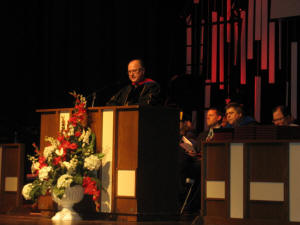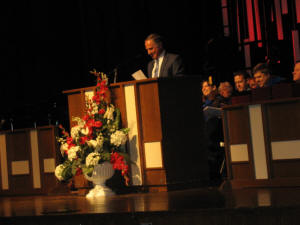|
 Both ceremonies began with an invocation and time of
worship. President Dr. Don Green welcomed friends, family, and
alumni from the class of 1967 celebrating their 50th reunion.
President Green congratulated the "distinguished class of 2017" and
asked family members of graduates to stand and be recognized for
supporting the graduates. Green also asked the graduates to express
their appreciation through applause to the faculty and staff who
taught and served them while they studied at LCU. Both ceremonies began with an invocation and time of
worship. President Dr. Don Green welcomed friends, family, and
alumni from the class of 1967 celebrating their 50th reunion.
President Green congratulated the "distinguished class of 2017" and
asked family members of graduates to stand and be recognized for
supporting the graduates. Green also asked the graduates to express
their appreciation through applause to the faculty and staff who
taught and served them while they studied at LCU.
President Green congratulated the "distinguished class of 2017" and
said, "You now join the ranks of 16,000 other Lincoln leaders who
have settled in every state in the United States and have served in
more than 165 different countries around the world."

Green said, "as you leave our campus, one of our offsite campuses,
or our online community, let me remind you that you are not leaving
our community because we are family. The combination that brought us
together four, five, six, or more years ago still binds us together
as we seek to fill God's mission in the world. You may have come
here for a major, but praise God, you are leaving on a mission.
God's mission."

Green quoted a 2016 speech delivered to the presidents of the
Council of Christian Colleges by New Time Times columnist David
Brooks on "the cultural value of a Christian education." Brooks said
those at Christian colleges are "the avante garde of the 21st
century culture" who "have what everybody else is desolate to have;
a way of talking about and educating the human person in a way that
integrates faith, emotion, and intellect." Brooks said these
colleges have "a recipe to nurture human beings who have a devoted
heart, a courageous mind, and a purposeful soul," unlike many other
institutions. Brooks said few secular institutions "integrate the
mind, the heart, and the spirit."

Green said he believes, "your worldview centered education
experience at Lincoln Christian University has integrated the mind,
the heart, and the spirit" and "you are equipped to make a better
world."
Green introduced speaker Habeeb Habeeb (both his first and last name
are the same), who came to Illinois in 1973 to study at Olivet
Nazarene University. Green said Habeeb completed his education at
Eastern Illinois University after years of "overcoming adversity and
making his way in the corporate world."
Green said Habeeb has been a leader in business as CEO of Benefit
Planning Consultants, a leader in the various community
organizations, and a leader in his church as an elder. Habeeb also
serves as an LCU trustee. Habeeb and his wife Joy reside in
Champaign where "many know how his story has been intertwined with
God's story."
Habeeb's keynote address at both ceremonies was "An Extraordinary
Destiny."

As he began Habeeb told the graduates "God has ordained an
extraordinary destiny for you and for each one of us." He said no
matter your background, your economic conditions, color, personality
traits, gender or ethnic heritage, "God is planning an awesome
future for you" and you should "start getting ready as you
expectantly await to fulfill your mission."
Habeeb said he hoped the road would be "smooth," and everything
would be "great" for the graduates, but also predicted that "you
will face adversity."

Habeeb said he has faced much adversity. He was the second of three
boys born in Lebanon to a family who was not wealthy, but had food
on the table.
Habeeb said he was the first in his family to graduate with a
four-year-degree. He said, "I was tender, shy, not a leader. I
wasn't going to set the world on fire. I was just a nice kid." He
had "outstanding grades" and said "I need to do something great so
that I can provide for my family when they retire."
Habeeb said he had planned to be a doctor and study in Beirut,
Lebanon. At some point, an American missionary in Beirut, suggested
Habeed go to Olivet Nazarene University, which was smaller than the
schools like Georgetown that he had considered.
Habeeb said he experienced culture shock at Olivet Nazarene not
understanding much of the slang.
He said civil war broke out in Lebanon while he was here. Without
cell phones or internet and just a few television stations, Habeeb
said, "I did not know whether my parents were dead or alive."
Habeeb said, "My prayers became more important to me than ever. The
stories of Bible men "that overcame and conquered and had adversity
were a terrific inspiration to me," he said.
Habeeb could not go back to Lebanon then as it was too dangerous.
He said, "while feeling sorry for myself, God showed me the story of
Joseph." He compared Joseph being sent to Egypt to "sending an
American to an ISIS controlled country." Habeeb said Joseph chose to
do the best he could while in Egypt. God ordained an "extraordinary
destiny" for Joseph.
Habeeb said that when Joseph faced his brothers he was not angry,
but said "it was to save lives that God has sent me here ahead of
you." Habeeb said he felt a bit like Joseph due to being in a
strange land and facing adversity. He said, "Maybe it was to save
lives that God sent me here ahead of my family."

[to top of second column] |

Habeeb said the books The Power of Positive Thinking by Norman
Vincent Peale and How to Win Friends and Influence People by Dale Carnegie also
inspired him. Habeeb said Peale's book taught him to have a positive attitude
and stop feeling sorry for himself. He said Carnegie's book taught him, "It's
not about me, it's about you, it's about them."
Habeeb said, "When I started pouring into other people's lives,
my cup never was empty." He said, whatever your job, "if you give more than you
receive, your cup will never be empty."
Habeeb said he faced being out on the street when the dorms were to be closed
for break. Habeeb said a friend told him about a job at Arby's, and he finally
applied. Habeeb did any task he was asked to do there and "kept getting promoted
and promoted." Habeeb said the Bible verse "Do the best you can while you are
working" was a mantra for him.
Habeeb being honorable to God and his employer eventually got him
promoted to Arby's corporate office. He also met his wife through working at
Arby's.
Habeeb said he was able to bring his parents to the states in 1990 because "God
allowed us to redeem the time." He was glad to have that time with his parents
though his mom passed away a few years later.

Habeeb got his MBA while working 60 hour weeks and helping his wife take care of
children. He was often up studying until two a.m., but was "joyfully doing it
because I wanted to get an MBA." He said, "I prayed to the Lord feverishly" for
a "white collar job in Champaign" and not some consulting job where he might be
working 100-hour-weeks.
Habeeb said as soon as he got the MBA, he got a job at Benefits Planning
Consultants, an employee benefits administration firm in Champaign. Habeeb is
now the co-owner.
Habeeb said he told his story not so people would feel sorry for
him, but "to tell you the principles I learned throughout." He said, "I have
learned to bloom where planted." Even when you do not have the job of your
dreams, Habeed said, you need to "do the best you can because the Lord is
watching, the Lord will really give you rewards."
Habeeb said Joseph helped others even while in prison. Joseph was sold at 17 and
started getting a better life at 30. Habeeb came the United States at 17 started
getting a better life at 30. Habeeb started being successful.
Habeeb said one of David Brook's books speaks of an Adam one and an Adam two
inside all of us. Adam one is about what is on a resume and "what's the world
going to do for me." Adam two is the "eulogy Adam" that asks, "what am I doing
for the world" and "what will they say about me when I die." Habeeb asked which
Adam would win, and answered, it is "the one you feed the most."

Habeeb said to keep himself "honest and humble," he goes to Deuteronomy 8. In
this passage, the Israelites have been in the wilderness for many years and are
about to enter the promised land. In Deuteronomy 8:2, the Israelites were told
to "remember how the Lord your God led you all the way in the wilderness these
forty years to humble you and test you in order to know what was in your heart,
whether or not you would keep his commands."
Habeeb said the Israelites were reminded the Lord was bringing them into a "good
land" with streams, fig trees, honey, and plenty of bread. In Deuteronomy, the
Israelites were told to "praise the Lord your God for the land" and "not forget
the Lord your God" or fail to observes his commands. The Israelites were warned
that they may be proud after becoming wealthy and "forget the Lord," saying
their own hands produced the wealth. He said the Israelites were told to
remember God gave them "the ability to produce wealth."
Habeeb said a story that keeps him from forgetting the Lord happened during
Christmas break in 1976. During the break, the school and the cafeteria would
close for a month, but he was allowed to stay in the dorm.
Habeeb said he had prayed about it and on the last day of classes, he got an
unaddressed envelope. A paper inside said, "Habeeb, we thought you could use
this," which was a $100 bill. He said " the Lord took care of me" as the money
provided him enough money for food all month.
In closing, Habeeb said, "I want to be the best example as a Christian and
ambassador for God. My charge to you is that you will never forget." He said,
"May the Lord bless you and keep you and give you ultimate success for his
glory."
Conferring of degrees
After Habeeb's message, undergraduate Academic Dean Dr. Peter Verkruyse handed
out degrees to each graduate individually. Verkruyse also mentioned each
student’s plans and any special awards or honors.

As graduates exited the stage, Lynn Laughlin, Special Assistant to the President
and Associate Vice President of Alumni Services, presented graduates with an
alumni pin, a first year membership card, and a letter from the Alumni
Association.
The 1 p.m. ceremony also had a time of worship followed by an address from
Habeeb. Those conferring degrees at the graduate commencement ceremony were Dr.
Rochelle Scheuermann, Interim Chief Academic Officer; Dr. Robert Rea, Professor
of Church History/Historical Theology; and Dr. C. Nolan Thomas, Associate
Professor of Mental Health Counseling
After graduate students descended the platform, Dr. Nolan Thomas, Associate
Professor of Clinical Mental Health Counseling presented each with a towel. This
practice began over 20 years ago and, Dr. Wayne Shaw has often said, “This towel
signifies that when our students graduate, it is not for arrogance, honor, or
prestige, but so that they might go out and wash the feet of the world. That is
what we are about.”
Doctor of Ministry graduates received a basin to complement the symbolism behind
the towels.
The message that is impressed upon the graduates is this, "Since you were born
with a divine destiny, this event is a major milestone in pursuit of your
dream."
[Angela Reiners] |